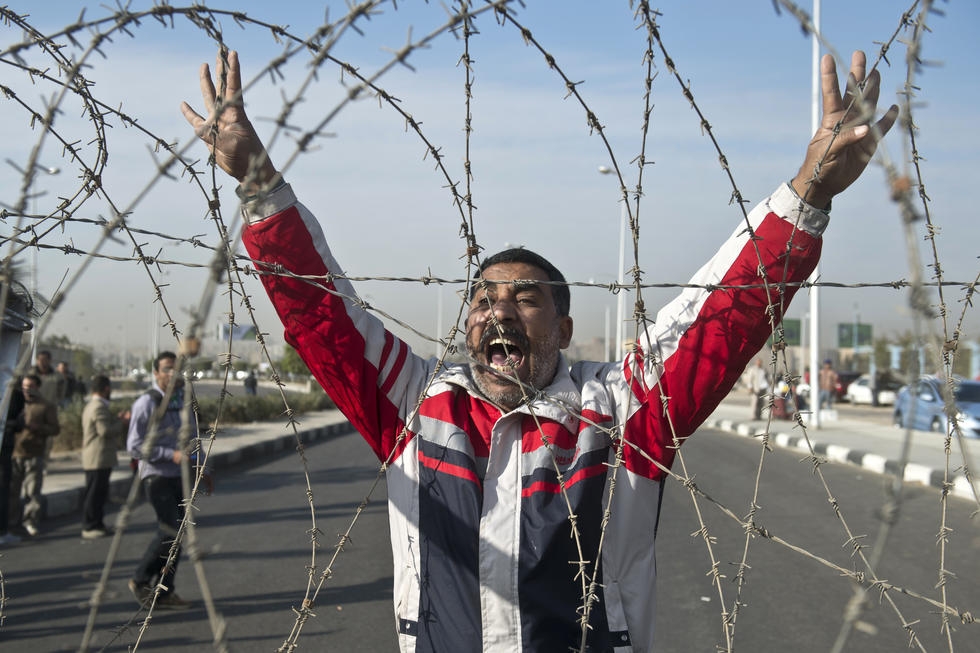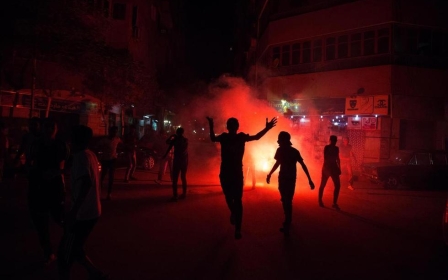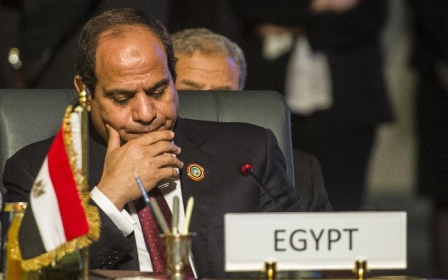Egypt’s blood-stained path to ‘democracy’

On 5 July 2013, two days after a military coup removed Egypt’s first democratically elected Islamist president Mohamed Morsi, one of his supporters, Mohamed Sobhy was shot in the head point-blank in broad daylight.
History books will remember Sobhy. They will remember that the pool of blood surrounding his bearded face on the burning asphalt that day was the first in the ocean of blood spilt over the following years.
Sobhy had joined hundreds of protesters outside the army’s Republican Guards Club where Morsi supporters believed he was being illegally detained. A soldier standing guard outside the club entrance behind a siege of barbed wire shot Sobhy at close range as he approached the barricade holding up a poster of the deposed president.
Five other protesters were shot dead that day.
The military junta held Morsi incommunicado in an undisclosed location for 76 days, setting in motion a pattern of state aggression and retaliation that has claimed hundreds of lives.
Three days later at the same location, according to a Human Rights Watch report, the military broke up a Muslim Brotherhood sit-in, killing at least 61 protesters. Two security officers were also killed.
More deaths ensued on 27 July, one day after Egypt’s de facto ruler and then Defence Minister Abdel Fattah al-Sisi asked Egyptians to give him a mandate to “fight terrorism” through a mass demonstration, when most of the 95 victims were killed with single-shot wounds to the head and chest.
In what HRW described as likely crimes against humanity, on 14 August, police reinforced by army soldiers broke up the two pro-legitimacy Brotherhood sit-ins at Rabaa Al-Adawiya and Al-Nahda squares in Cairo, killing at least 1,000 people. A small number of protesters in the Rabaa sit-in responded to the police with gunfire, killing seven policemen.
“In Rabaa Square, Egyptian security forces carried out one of the world’s largest killings of demonstrators in a single day in recent history,” said Kenneth Roth, executive director of HRW. “This wasn’t merely a case of excessive force or poor training. It was a violent crackdown planned at the highest levels of the Egyptian government.”
And on 18 August, 37 detainees were gassed to death in the back of a sweltering police truck parked in the forecourt of Abu Zaabal prison where they were left for six hours without ventilation or water, then attacked with teargas canisters under the pretext of subduing an escape attempt. The next day 25 conscripts were killed in Sinai by Islamist extremists angered by Morsi's removal.
Less than a year on, a rare 10-year sentence was handed down to a high-ranking police officer for gross negligence in the police truck case, but the same misdemeanours court annulled the verdict three months later.
Today, there is an all-out war happening in Egypt’s North Sinai region, one that is slowly but surely crawling towards the capital.
On 29 June, Egypt’s Public Prosecutor Hisham Barakat was assassinated when a remote-controlled car bomb detonated near his motorcade as he left his home.
This was the first assassination of a top government official since the 1990 killing of Parliament Speaker Rifaat El Mahgoub, but certainly not the first attempt to target such a senior figure.
There is no doubt that Egypt is about to enter a new phase of the insurgency against the current regime, one marked by Beirut-style assassinations.
Barakat was the likely target of militant activity that is growing stronger and more potent by the day. As public prosecutor, he placed a veneer of legitimacy on the Raaba massacre, since he gave the order to disperse the sit-in. The Interior Minister Mohamed Ibrahim, who survived a similar attempt on his life in September 2013, was the muscle, implementing Barakat’s directives with brutality and vengeful resolution.
While there was no immediate claim of responsibility for the attack on Barakat, it is no coincidence that it came one day after an Egyptian Islamist group affiliated with the Islamic State, calling itself Sinai Province, posted a video showing details of a May attack that gunned down several judges, in a clear warning of more to come.
The symbolism of Barakat’s assassination on the eve of 30 June, the two-year anniversary of nationwide protests that eventually led to Morsi’s removal, accentuates his controversial tenure.
Barakat was in office when the Muslim Brotherhood (MB) was officially banned and designated a terrorist group and was responsible for initiating cases against and imprisoning hundreds of Brotherhood members and others opposed to the military takeover.
He referred Morsi, the Brotherhood’s spiritual guide Mohamed Badie and senior members of the group to trial in what international human rights organisations described as kangaroo courts, where hundreds were handed down death sentences despite the existence of no reasonable or real evidence against them.
Barakat also spearheaded the prosecution of journalists and non-Islamist opposition activists known for their involvement in the 2011 uprising.
Today an Amnesty International report says that an estimated 40,000 detainees languish in prison, many of them without charge or access to due process. The political space is restricted to a degree not witnessed even under 30-year dictator Mubarak, an anti-protest law all but guarantees detention, if not death with impunity, to anyone participating in any form of public dissent.
Yet in a Kafkaesque statement he gave at Barakat’s funeral, Sisi emphasised his administration’s stoic adherence to the law and to the fact that they have not taken a single extra-judicial measure to date, leading to the natural conclusion that those laws which have “long chained the arms of justice” must be amended to ensure “rapid justice”, a euphemism for the immediate execution of Muslim Brotherhood leaders.
And in the absence of lawmakers, since legislative elections have been postponed indefinitely, Sisi alone has the authority to pass laws by decree.
Cabinet has already convened Wednesday and in a record three hours approved a stricter anti-terrorism law that would fast-track criminal court proceedings.
Minister of Parliamentary Affairs and Transitional Justice Ibrahim al-Heneidy reportedly said that the Criminal Procedures Law was amended to cut short the trials of militants and terrorists by giving defendants the right to only a single appeal before the binding ruling of the Court of Cassation.
Appeals submitted by defendants facing trial under the new terrorism law will now be reviewed and settled within a maximum of three months, which in a judicial system notorious for its politicised court cases can only ensure the rapid implementation of gross injustice.
Under the current administration, propped up by a neighbourhood of tyrants, mass-murderers and colluding Western powers, Egypt is nowhere closer to becoming the promised haven of democracy, security, stability and economic prosperity.
Egypt’s “war on terrorism”, Sisi’s self-fulfilling prophecy, has sown the seeds of more deadly conflict. Planned amendments to the penal code are a flagrant violation of the basic rules of any legal order, the right to a fair trial and the right to appeal, and will give birth to more disaffected youth bound to be manipulated by the likes of Islamic State or whatever new threat to world peace is in fashion.
But the formula for reconciliation is clear and simple: a nuanced political approach that includes the release of the thousands detained without charge; an end to forced disappearances, respect for the rule of law, due process, fair trials; and opening the doors for the reintegration of the Brotherhood in society.
While this seems like a mirage in a dream, nothing is impossible if the political will exists to make it happen.
The alternative? We don't need to look too far - Syria, Iraq, Yemen.
- Rania Al Malky is a Cairo-based columnist and former editor of Daily News Egypt (2006-2012).
The views expressed in this article belong to the author and do not necessarily reflect the editorial policy of Middle East Eye.
Photo: A supporter of Muslim Brotherhood ousted president Mohamed Morsi flashes the "Rabaa" sign behind barbed wire outside the police academy where takes place the second hearing in his murder trial on January 8, 2014 in Cairo. (AFP)
New MEE newsletter: Jerusalem Dispatch
Sign up to get the latest insights and analysis on Israel-Palestine, alongside Turkey Unpacked and other MEE newsletters
Middle East Eye delivers independent and unrivalled coverage and analysis of the Middle East, North Africa and beyond. To learn more about republishing this content and the associated fees, please fill out this form. More about MEE can be found here.





